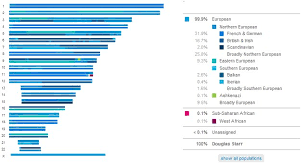Unveiling the Truth: Navigating Ancestry DNA Accuracy
The Accuracy of Ancestry DNA Testing
Ancestry DNA testing has become increasingly popular in recent years, offering individuals the opportunity to uncover their genetic heritage and connect with their roots. However, questions often arise regarding the accuracy of these tests and the reliability of the results they provide.
While ancestry DNA testing can provide valuable insights into a person’s genetic background, it is essential to understand that these results are not always 100% accurate. Several factors can influence the accuracy of ancestry DNA testing, including the size and diversity of the reference database used by the testing company, the algorithms and methodologies employed in analyzing DNA data, and the limitations of genetic science itself.
It is important to approach ancestry DNA testing with a critical mindset and an awareness of its limitations. While these tests can offer fascinating information about your genetic ancestry, they should not be viewed as definitive proof of your heritage. Genetic ancestry is just one piece of the puzzle when it comes to understanding your family history.
Additionally, variations in results may occur between different ancestry DNA testing companies due to differences in their reference databases and analysis techniques. Therefore, it is recommended to take multiple tests from reputable companies if you are seeking a comprehensive understanding of your genetic background.
Ultimately, while ancestry DNA testing can be a valuable tool for exploring your heritage and connecting with distant relatives, it is essential to approach the results with caution and maintain a healthy skepticism about their accuracy. Understanding the limitations of these tests can help you interpret your genetic ancestry results more effectively and appreciate them as part of a broader exploration of your family history.
Top Questions About Ancestry DNA Accuracy Answered
- Can I trust ancestry with my DNA?
- Which DNA ancestry is most accurate?
- Why is my AncestryDNA test wrong?
- Is Ancestry or 23andMe more accurate?
Can I trust ancestry with my DNA?
When considering whether to trust Ancestry with your DNA, it is important to weigh the benefits and potential risks associated with genetic testing. Ancestry is a reputable company with a large database and established track record in the field of genetic genealogy. However, it is crucial to understand that sharing your DNA data with any company, including Ancestry, comes with privacy considerations. While Ancestry has strict policies in place to protect your genetic information, there is always a small inherent risk of data breaches or unauthorized access. It is advisable to carefully review Ancestry’s privacy policies and terms of service before deciding to share your DNA, and to make an informed decision based on your comfort level with the potential implications of genetic testing.
Which DNA ancestry is most accurate?
When it comes to determining the most accurate DNA ancestry testing service, it is essential to consider various factors that can influence the reliability of the results. The accuracy of DNA ancestry testing can be influenced by the size and diversity of the reference database used by each testing company, the algorithms and methodologies employed in analyzing DNA data, and the overall quality control measures in place. While some companies may have larger databases or more advanced analysis techniques, there is no definitive answer to which DNA ancestry test is the most accurate. It is recommended to research multiple reputable testing services, compare their methodologies and customer reviews, and consider taking tests from different companies for a more comprehensive understanding of your genetic heritage.
Why is my AncestryDNA test wrong?
It is common for individuals to question the accuracy of their AncestryDNA test results when discrepancies or unexpected findings arise. Several factors can contribute to perceived inaccuracies, including the limitations of genetic testing technology, the complexity of genetic inheritance patterns, and variations in reference databases used by testing companies. It is important to remember that ancestry DNA testing provides estimates based on statistical probabilities and historical data, rather than definitive answers. Therefore, discrepancies in test results should be approached with an understanding of these complexities and a recognition that genetic ancestry is just one aspect of a broader family history narrative.
Is Ancestry or 23andMe more accurate?
When comparing the accuracy of Ancestry and 23andMe, it’s important to understand that both companies utilize different reference databases, algorithms, and methodologies in analyzing DNA data. As a result, the accuracy of ancestry DNA testing results can vary between these two popular testing services. While both Ancestry and 23andMe provide valuable insights into genetic ancestry, it is recommended to consider taking tests from both companies or consulting with genetic experts to gain a more comprehensive understanding of your genetic background. Ultimately, the choice between Ancestry and 23andMe should be based on your specific research goals and preferences for interpreting genetic ancestry results.

